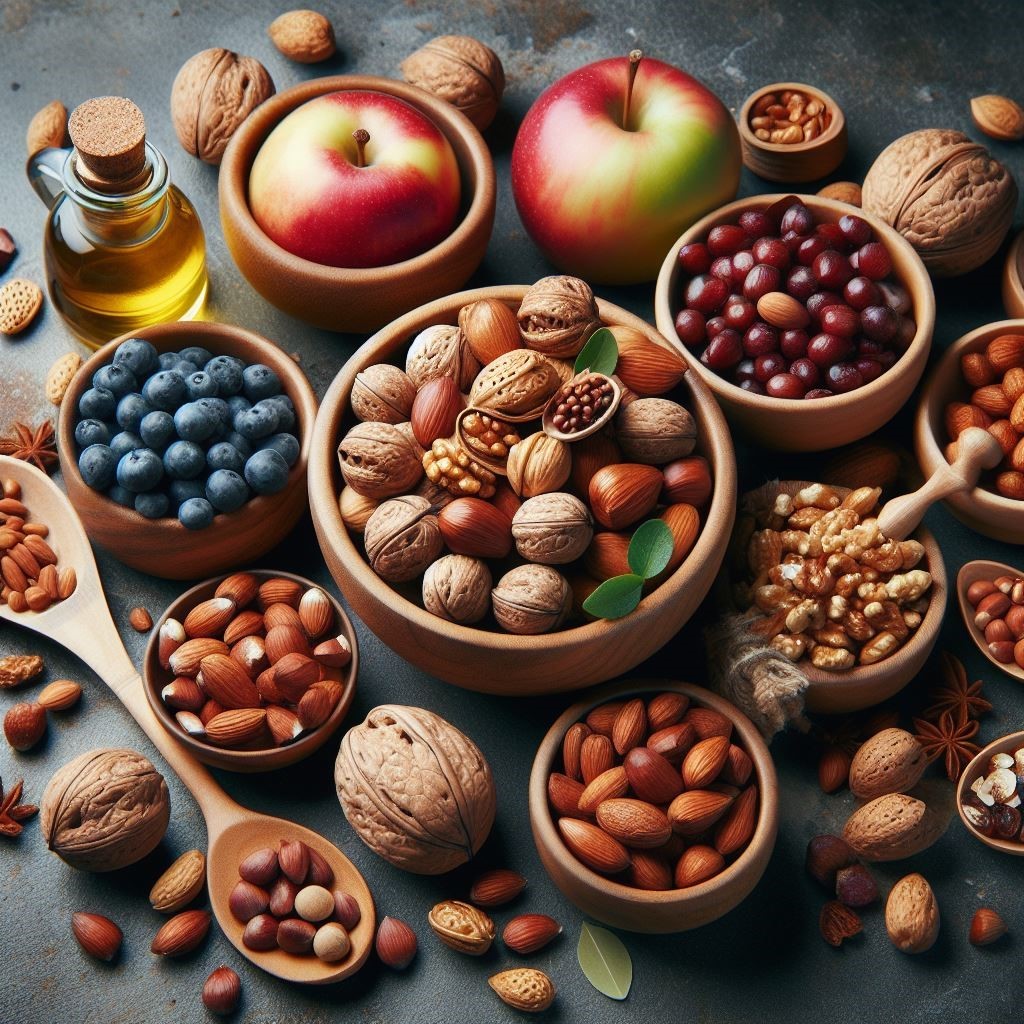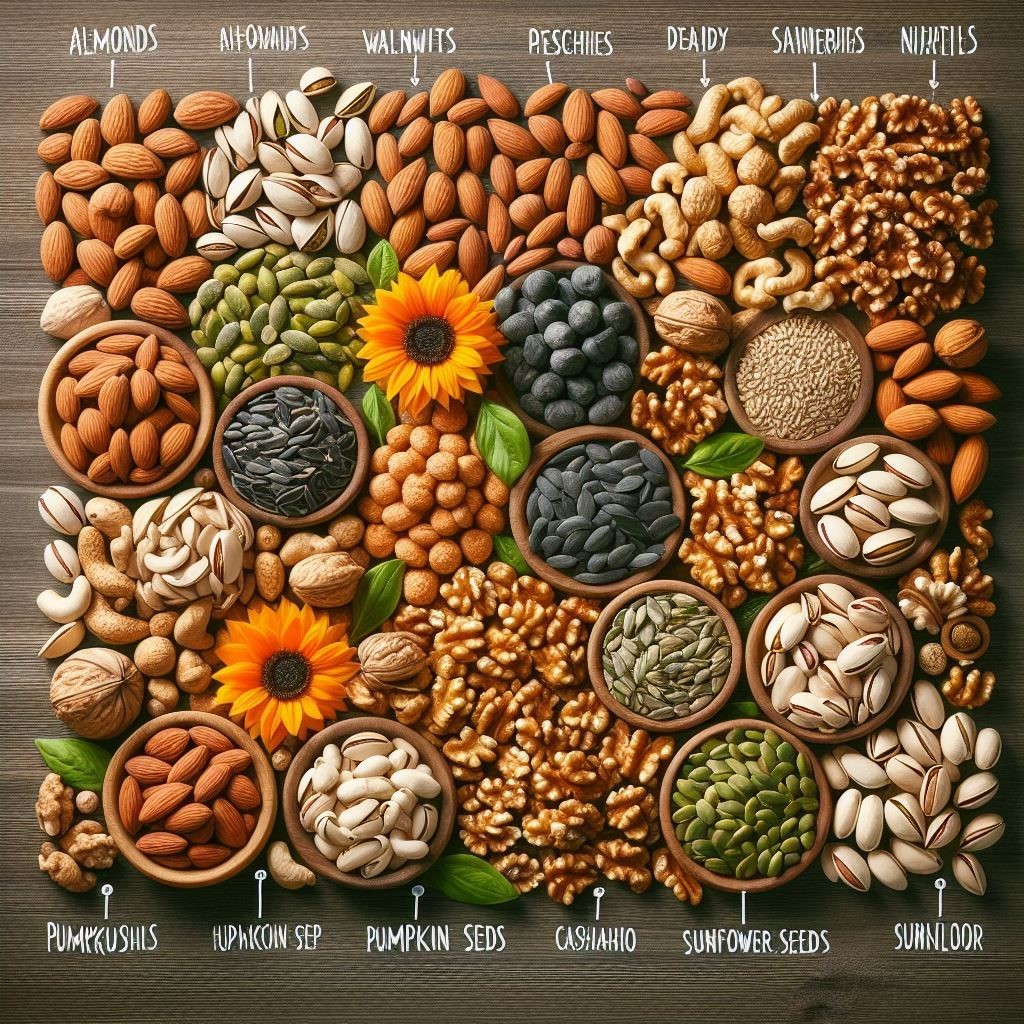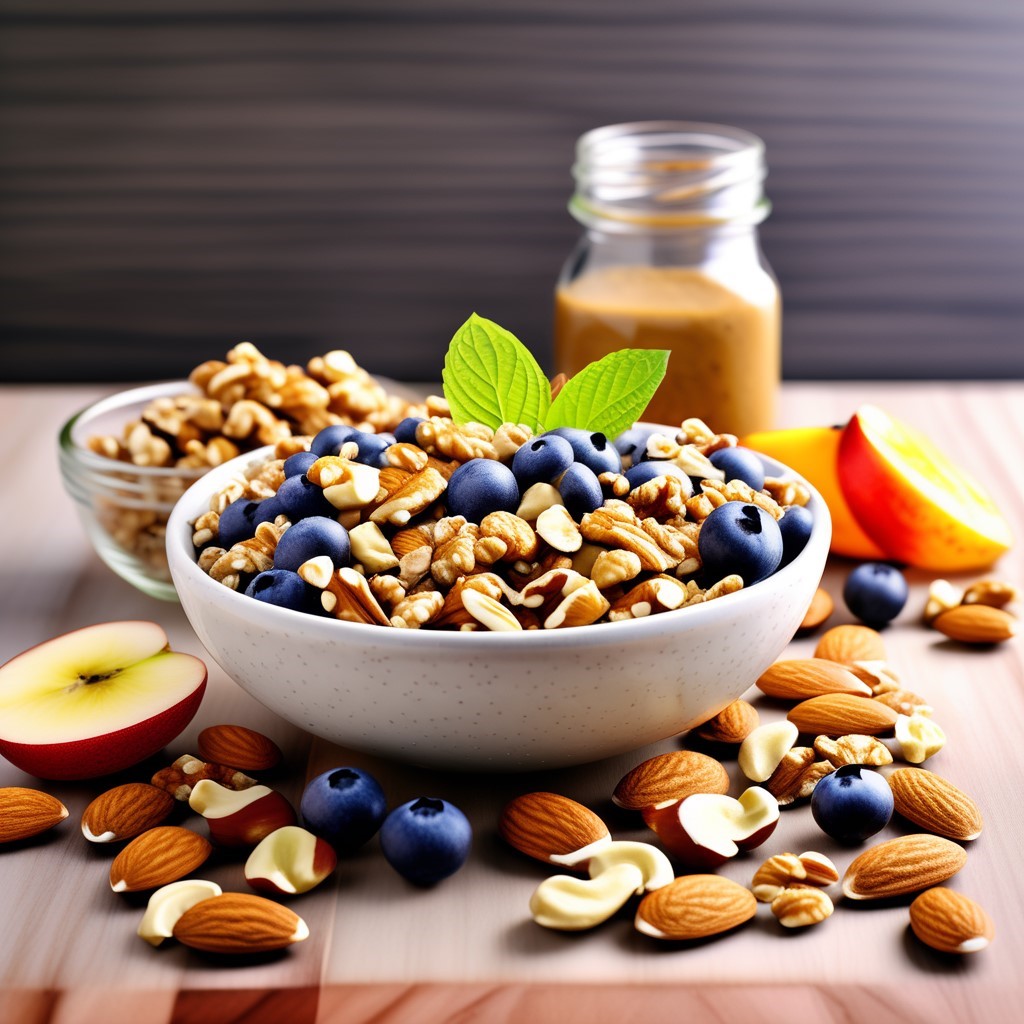Top 10 Nuts Unveiled: The Surprising Health Boosts You’re Missing Out On!
Nuts are one of nature’s superfoods. They are packed with protein, fiber, healthy fats, vitamins, minerals, and powerful plant compounds.
They provide a variety of impressive health benefits, yet many people don’t consume them regularly.
Top 10 health benefits of eating nuts.

1. Are High in Protein
Nuts are an excellent plant-based source of protein.
Protein is essential for building and repairing cells and tissues. It also functions as an energy source during exercise.
A 1-ounce (28-gram) serving of nuts provides between 4–7 grams of protein, depending on the type.
This makes nuts a valuable protein source, especially for those following vegetarian or vegan diets.
Nuts are one of the best sources of plant-based protein. For example, almonds contain 6 grams of protein per ounce, while walnuts contain 4 grams.
2. Are Packed with Healthy Fats
Nuts get most of their calories from fat.
However, the fats found in nuts are mostly monounsaturated and polyunsaturated fats — the types associated with reduced disease risk when eaten in moderation.
Nuts also contain some saturated fat, but only in small amounts.
For example, around 85–90% of the fat in peanuts is unsaturated, while approximately 70% of the fat in pecans is unsaturated.
Nuts that are especially high in healthy fats include:
- Walnuts
- Hazelnuts
- Pecans
- Almonds
- Pistachios
- Cashews
These unsaturated fats may improve blood cholesterol levels when eaten in place of refined carbs or saturated and trans fats.
3. Are Loaded with Fiber
Nuts are an excellent source of fiber, providing both soluble and insoluble varieties.
Fiber passes through your digestive tract undigested, promoting fullness, feeding your healthy gut bacteria, and easing bowel movements.
Soluble fiber dissolves in water, forming a gel-like substance in your digestive tract. It helps lower LDL (bad) cholesterol and blood sugar levels.
Insoluble fiber does not dissolve in water. It helps food move smoothly through your digestive tract.
A 1-ounce serving of nuts provides between 2–5 grams of fiber, which is up to 20% of the Reference Daily Intake (RDI).
Almonds and pistachios are especially high in fiber, providing around 3.5 grams per ounce.
4. Are Rich in Vitamins and Minerals
Nuts contain a wealth of essential vitamins and minerals:
- Thiamine: An important B vitamin. Promotes normal nerve and brain function.
- Magnesium: Involved in over 300 enzymatic reactions in your body. Many people don’t get enough of this essential mineral.
- Phosphorus: Works closely with calcium to build bones and teeth. Also supports cell membranes.
- Zinc: An essential trace element. Required for immune function, DNA synthesis, and cell division.
- Potassium: An important electrolyte that controls electrical currents in your body. Associated with reduced blood pressure.
- Vitamin E: A powerful antioxidant that protects cell membranes against damage caused by free radicals.
- Vitamin K: Supports healthy blood clotting and bone health.
- Copper: An essential trace element that aids iron absorption and is required to make energy in your cells.
A 1-ounce (28-gram) serving of nuts provides around 15–25% of the RDI for these nutrients.
5. Are an Excellent Source of Plant-Based Protein
They are one of the best sources of plant-based protein.
For example, almonds contain 6 grams of protein per ounce, while walnuts contain 4 grams.
Plant-based protein is just as good for your health as animal protein. Eating more plant protein can benefit health by reducing inflammation and decreasing heart disease and diabetes risk.
They are among the most convenient options for increasing high-quality plant protein. They require no preparation and can be eaten as a snack or incorporated into various recipes.
Some nuts highest in protein include peanuts, almonds, pistachios, cashews, and pine nuts.
6. May Help You Lose Weight
Although they are calorie-dense, several studies have found that eating more of them may help you lose weight.
In one review of 31 long-term studies, people who ate nuts at least twice a week had a lower risk of being overweight than those who rarely ate nuts.
This may be because nuts boost metabolism slightly while providing satiety. The protein, fiber, and fat in nuts help you feel fuller for longer periods, reducing total calorie intake.
For example, in one study, participants who ate 1.5 ounces (43 grams) of almonds daily reduced their calorie intake and experienced significant weight loss compared to nut avoiders.
7. May Reduce Inflammation
Chronic inflammation is linked to a wide range of health problems, including heart disease, diabetes, and autoimmune disorders.
Nuts contain powerful anti-inflammatory compounds that can reduce inflammation throughout your body.
For example, almonds, pecans, and pistachios contain high amounts of quercetin, a plant compound that acts as a strong anti-inflammatory antioxidant.
Regularly consuming it may help reduce levels of inflammatory markers like C-reactive protein (CRP), interleukin 6 (IL-6), and tumour necrosis factor α (TNF-α).
8. May Lower Your Risk of Heart Disease
Heart disease is a worldwide epidemic, responsible for over 17 million deaths annually.
Multiple studies link nut consumption to reduced heart disease risk factors, including:
- Lower LDL (bad) cholesterol: Nuts lower LDL cholesterol because of their high monounsaturated fat content.
- Reduced triglycerides: Triglycerides are a type of fat in your blood. High levels raise heart disease risk. Eating nuts lowers triglyceride levels.
- Lower blood pressure: The magnesium, potassium, and amino acids in nuts help relax blood vessels, lowering blood pressure.
- Less arterial stiffness: Arterial stiffness refers to the rigidity of your arteries, which drives blood pressure up. Nuts reduce stiffness.
- Better artery function: Flow-mediated dilation (FMD) measures how well your arteries dilate in response to increased blood flow. Nuts improve FMD.
- Reduced inflammation: Lowering inflammation reduces plaque buildup in your arteries.
For all these reasons, regular nut intake is linked to a lower risk of heart attack, stroke, and death from heart disease.
9. Help Control Type 2 Diabetes
Type 2 diabetes affects over 400 million people worldwide.
It’s characterized by impaired insulin function and chronically high blood sugar levels.
However, multiple studies report that frequently eating it can lower your chances of developing type 2 diabetes.
Eating it may also reduce fasting insulin levels and improve insulin resistance in people with diabetes.
For example, consuming about 0.5–1 ounce (15–30 grams) of nuts five times weekly lowers diabetes risk by nearly 15%.
Healthy fats, fiber, magnesium, and antioxidants all play a role in controlling blood sugar levels.
10. May Lower Your Risk of Certain Cancers
Eating it regularly is linked to a reduced risk of certain types of cancer, including:
- Colon cancer: In several studies, nut intake is linked to a significantly lower risk of colon cancer in women.
- Endometrial cancer: The high lignan content of some nuts may protect against endometrial cancer. Lignans have estrogen-like properties.
- Lung cancer: Substituting nuts for red meat may reduce your risk of lung cancer.
- Prostate cancer: Men who eat over 5 servings of nuts per week have a lower risk of prostate cancer.
They contain potent antioxidants like quercetin and lignans, which may explain their protective effects. Some also contain vitamin E, which has strong anticancer properties.
Types of Nuts and Their Benefits

There are many delicious and nutritious nuts to choose from. Here is more information on some of the most popular varieties and their specific benefits.
Almonds
Almonds are one of the most widely consumed nuts. They are loaded with vitamin E, magnesium, fiber, antioxidants, and healthy fats.
Potential health benefits of almonds include:
- Lower LDL cholesterol and triglycerides
- Reduce blood pressure.
- Control blood sugar levels
- Promote weight loss.
- Reduce hunger and promote fullness.
Walnuts
Walnuts are a successful source of omega-3 fatty acids, which provide anti-inflammatory effects. They are also high in antioxidants.
Potential walnut health benefits:
- Improve brain health.
- Enhance heart health.
- Reduce inflammation.
- Help control diabetes.
- Promote weight loss.
Pistachios
Pistachios contain more protein and fiber than most other nuts. They also pack a big antioxidant punch.
Possible health perks of pistachios:
- Lower LDL cholesterol
- Reduce blood pressure.
- Increase antioxidant levels.
- Improve gut health.
- Help manage weight.
Pecans
Pecans deliver a big dose of minerals like manganese, copper, magnesium, and zinc. They also contain antioxidants.
Benefits linked to pecans:
- Protect against inflammation.
- Support brain health
- Stabilize blood sugar levels.
- Lower LDL cholesterol
- Aids weight loss
Cashews
Cashews are rich in heart-healthy unsaturated fats and various vitamins and minerals. They also contain soluble fiber.
Potential cashew health benefits:
- Reduce triglycerides.
- Lower blood pressure
- Decrease inflammation.
- Support bone health
- Promote feeling full.
Macadamia Nuts
Macadamia is a dense source of healthy fats, antioxidants, vitamin E, and manganese.
Possible macadamia health perks:
- Lower cholesterol
- Improve heart health.
- Reduce oxidative stress and inflammation.
- Support brain function
- Aid digestive health
Brazil Nuts
Brazil nuts are an excellent source of selenium, providing way over your daily needs in just 1–2 nuts.
Benefits linked to Brazil nuts:
- Enhance immune function.
- Support thyroid health
- Improve mood.
- Protect heart health.
- Reduce inflammation.
As you can see, all nuts offer unique protective compounds and health benefits. Mix up the varieties you eat to take full advantage of their diverse nutritional profiles.
Nuts to Include in Your Diet:
- Almonds
- Walnuts
- Pistachios
- Pecans
- Hazelnuts
- Cashews
- Brazil nuts
- Macadamia nuts
- Peanuts
- Pine nuts
Ways to Enjoy Nuts:

- Raw as a snack
- Sprinkled on salads or yogurt.
- Added to oatmeal or cereal.
- Included in trail mixes.
- As a nut butter on toast or apples
- Accounted for in energy bars.
- Grind into flour for baking
- Mix into granola.
So, in summary, they are an easy way to add valuable nutrition to your diet. Their impressive nutrient profile provides powerful health benefits. Enjoy a handful daily to take advantage of their many perks. With so many options, there are endless ways to incorporate more nuts for better health!
Conclusion
Incorporating more nuts into your diet is a tasty way to boost nutrition and protect your health. They’re packed with protein, fiber, vitamins, minerals, and plant compounds. Eating it provides impressive health benefits, including easier weight control, lower cholesterol, improved heart health, and reduced diabetes and cancer risk.
While they are very calorie-dense, studies show that your body does not fully digest or absorb all these calories. So don’t be afraid of moderate portions — an ounce daily is healthy. Just make sure not to go overboard, as large amounts provide excessive calories. When snacking on it, a handful is a reasonable serving size. Overall, nuts are one of the healthiest and most nutritious foods you can eat. Including them in your diet regularly promotes health and longevity.
Key Points
- Nuts are high in protein, fiber, antioxidants, vitamins, and minerals.
- They provide healthy fats that may promote weight loss and reduce disease risk.
- Nuts may help reduce inflammation, control diabetes, lower cholesterol, and decrease heart disease risk.
- Eating it regularly is linked to reduced risks of certain cancers.
- Aim to eat a handful, around 1 ounce, daily to get the most benefits.
| Top 5 Nuts Highest in Protein Grams | of Protein per Ounce |
| Almonds | 6 g |
| Pistachio Nuts | 6 g |
| Pumpkin Seeds | 5 g |
| Peanuts | 5 g |
| Cashews | 5 g |
| Top 5 Nuts Highest in Healthy Fats grams | of Fat per Ounce |
| Macadamia Nuts | 21 g |
| Pecans | 20 g |
| Brazil Nuts | 19 g |
| Walnuts | 18 g |
| Almonds | 14 g |



